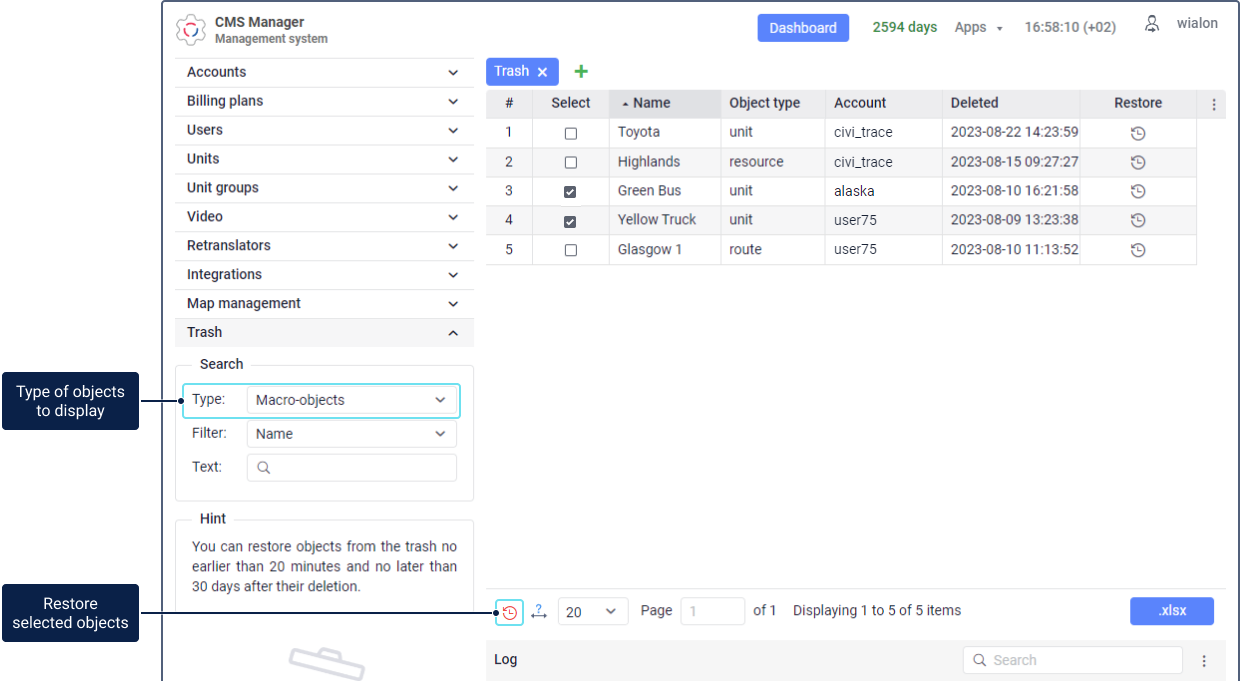The Trash section is available only to the user of the top account.
Depending on the object type selected in the Search section, the trash contains the deleted micro- or macro-objects of the system. In the case of micro-objects, only drivers, trailers, and passengers are shown here.
The objects are stored in the trash for 30 days after deletion and, if necessary, you can restore them during this time.
Table of deleted objects
The table of the deleted objects contains the following columns:
| Column | Description |
|---|---|
# | The row number. |
Select | The selection of an object in the table. You can select several objects to restore them simultaneously. See more below. |
Name | The name of the deleted object. |
Object type | The type of the deleted micro- or macro-object. |
Creator | The user indicated as the object creator. If this user has been deleted, a dash is displayed. The column is available only for macro-objects. |
| Resource | The resource in which the deleted object was stored. This column is available only for micro-objects. |
| Account | The name of the account the deleted object belonged to. |
| Code | The code of the deleted driver, trailer or passenger that was used for assigning to units. This column is available only for micro-objects. |
| Unique ID | The unique ID of the deleted unit. If two unique IDs are specified in the unit properties, the column shows both. |
| Phone number | The phone number from the properties of the deleted objects. If two phone numbers were specified in the properties, the column shows both. |
| Object deleter | The user who deleted the object. |
| Unit deletion reason | The reason given by the user at the time of deleting the unit in CMS Manager. |
Deleted | The date and time of deleting the object. |
Restore | The icon for restoring the object. |
If necessary, you can sort the data by any column, hide the unnecessary columns, export the table, etc. See more about working with tables here.
Restoring objects
To restore an object, click on the icon in its row. To restore several objects at once, mark them in the Select column and click on the icon at the bottom of the table.
You can restore objects no earlier than 20 minutes after they are deleted. If less than 20 minutes have passed, the objects are displayed in the table with the Restore icon disabled.
Particularities of restoring micro-objects
Micro-objects (drivers, trailers, and passengers) are restored to the resource where they were stored before deletion. If this resource is deleted, the micro-objects can't be restored separately, you should restore the entire resource.
Drivers, trailers and passengers are restored together with their assignment history.
Particularities of restoring macro-objects
The restored macro-objects are added to the top account. Units can be transferred to the subordinate accounts. Other types of objects can't be transferred, so you should create them in the subordinate accounts again.
The object creator and the users higher in the hierarchy get all access rights to the restored object.
When restoring units, take into account the following particularities:
- a unit will no longer belong to a group after restoring, if the group has been changed in any way;
- the unit messages are restored together with the unit;
- you can't restore a unit if the system has another one with the same unique ID and device type or with the same phone number.


